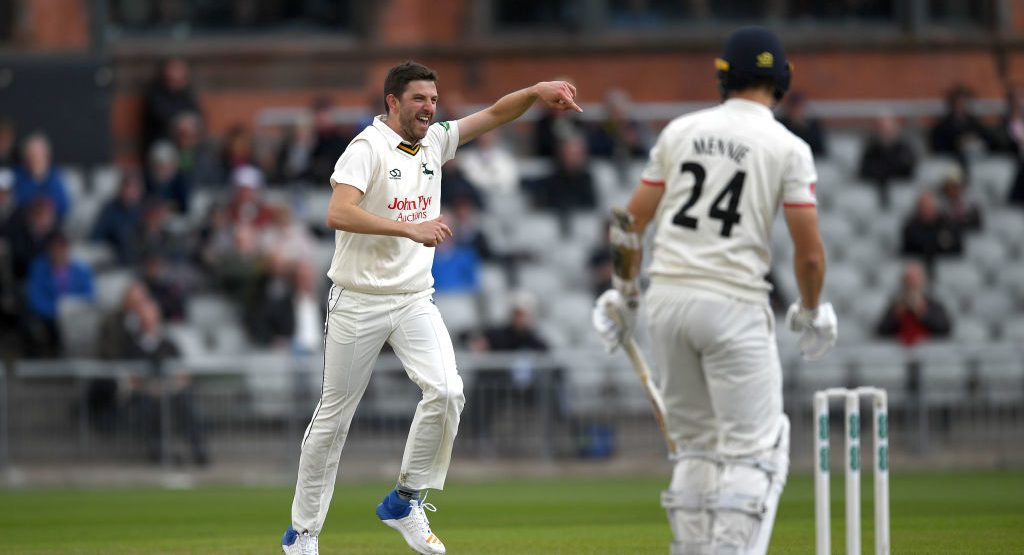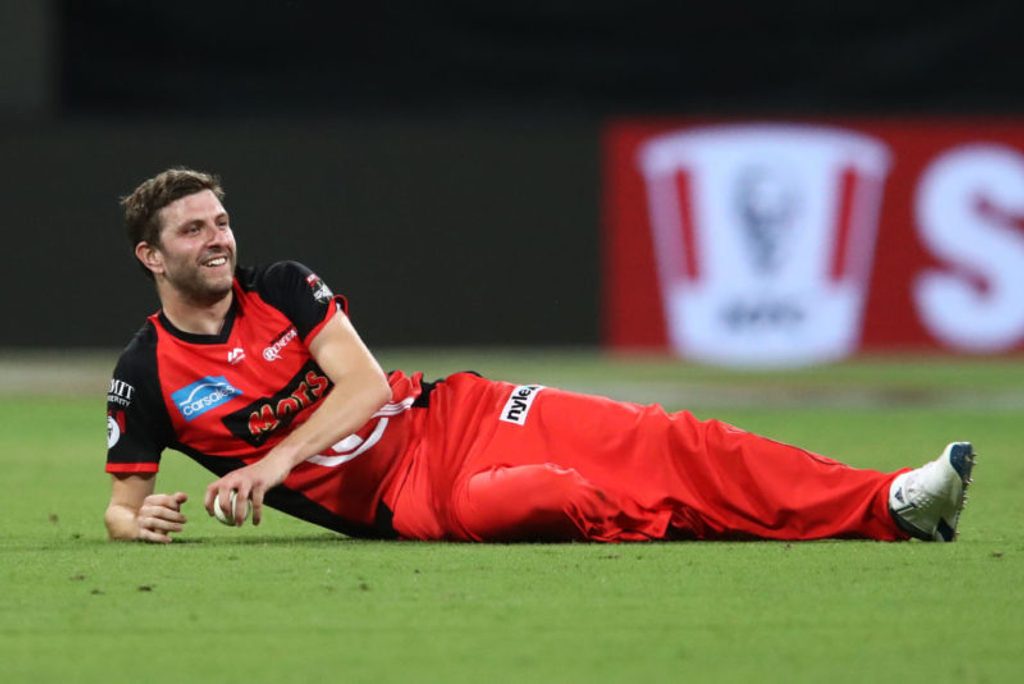
Rich Evans caught up with T20 franchise bowler Harry Gurney, who pulled no punches with his assessment of the longer formats of the game.
Having participated in the Sharjah-based T10 League, Big Bash League, Pakistan Super League and Indian Premier League during a career-spinning English off-season, it hardly induced shockwaves when Nottinghamshire announced earlier this month that fast bowler Harry Gurney, who played 10 ODIs and two T20s for England in 2014, would be signing a white-ball-only contract this season.
While Nottinghamshire coach Mike Newell extended his county’s “disappointment”, it was largely inevitable – not only due to Gurney’s hugely successful winter, but also the gradual trend of thirty-something speedsters opting to preserve their bodies for short-form cricket. Gurney had topped Nottinghamshire’s County Championship wicket-takers chart in 2018, with 42 wickets at 27.07.
Newell reluctantly added: “He’s one of the best white-ball bowlers around. Once he made his decision, if we didn’t offer him a white-ball deal there would be 17 other counties wanting him to bowl for them.” Due to a scheduling conflict with the IPL, there’s every chance Gurney has also played his last 50-over game for his county.
 Harry Gurney celebrates taking his sixth wicket against Lancashire, April 2018
Harry Gurney celebrates taking his sixth wicket against Lancashire, April 2018
A few weeks before the announcement, speaking from his hotel room in Dubai, where he was turning out for Quetta Gladiators in the PSL, Gurney did not waver on where his career was headed. “My priority for the rest of my career is T20 cricket,” he asserted. “I’m not going to lie to you. I played 103 first-class games and I’m really proud of what I achieved in that format.
“T20 cricket is the format I enjoy the most. I want to expose myself to as many T20 competitions as I can during the rest of my career. That doesn’t mean I’m resting on my laurels. Yes, this lifestyle has started well, but I know it can be fickle.”
Gurney had always been intrigued by the world of franchise cricket but hadn’t actively sought a contract; that is until he signed with an agency called Insignia, who worked with a few other Notts boys, at the end of last summer. With a wife and young baby Arthur to support, the financial rewards were of course alluring; this year he’s set to earn double what he netted last year, with the former England international set to be paid £83,000 during his eight-week stint in the IPL.
 Harry Gurney of Melbourne Renegades drops a catch during the Big Bash League
Harry Gurney of Melbourne Renegades drops a catch during the Big Bash League
But it’s also about the buzz; the wiry fast bowler cited a trophy-lifting BBL season with Melbourne Renegades as the apogee of a magnificent winter.
“The Big Bash was one of the greatest cricketing experiences of my life,” he said. “I love Australia as a country – I love spending time there, especially in December to February when England is so miserable! Initially, I was just delighted to get a contract, but to play a key role in winning the trophy was beyond my wildest dreams. It’s a career highlight.”
The 32-year-old is out of contract for next season’s BBL, but after conceding just 7.17 an over in nine games bowling primarily at the death and in the powerplay, another gig seems highly likely.
It was no small feat for the man Mark Waugh labelled as a “left-arm Mr Bean” whose action was reminiscent of a fourth-grader. “I’m not too precious,” Gurney laughed. “I don’t believe in being offended. Just a bit of banter, and I bit back a little on Twitter. I’ve often said I have the body of a 50-year-old accountant anyway, so I don’t necessarily disagree with him”.
My thoughts:
– People have been calling me Mr Bean for years, I think it’s likely he would be a better batter than me.
– Mr Bean did actually rock up for Bankstown… 1st grade though and got 5fer most weeks.
– Mr Bean has got a @BBL winners medal. @juniorwaugh349 ? https://t.co/rFKGFBHB3u— Harry Gurney (@gurneyhf) February 17, 2019
Twenty-four hours after lifting the trophy, still feeling the after-effects of the after-party, Gurney, along with Dan Christian – his Nottinghamshire captain who has publicly proclaimed Gurney as “the best death bowler in the world” – and Ben Dunk, boarded a plane to Dubai for the PSL.
It was a contrasting experience; the Big Bash League is owned by Cricket Australia, players have their own car and more independence, whereas PSL teams are privately owned, you’re largely hotel-bound and there’s lots of bus travel – not to mention the differing pitch conditions and other cultural quirks.
But the globetrotting lifestyle suits the pacer. On the eve of flying to Karachi (PSL matches were split between Pakistan and Dubai), Gurney wasn’t distressed at the prospect of entering a country that has not hosted a Test match since the Sri Lanka bus attack in Lahore in March 2009. “I’m told it’s an amazing country – the passion for Pakistan cricket is electric. Like in India, it’s an obsession.” He only played one match in the PSL, and has yet to feature in his debut IPL campaign.
***
Gurney’s love affair with T20 cricket in recent months has only served to substantiate his belief that the longer forms of the game are in terminal decline. “It might sound radical, and it will upset a lot of people, but I don’t think red-ball cricket has a long-term future,” he says. “The situation is more terminal than people realise. In my lifetime, I think it will cease to exist. There might be exhibition matches – the equivalent of an England Lions rugby tour, perhaps. I hope I’m wrong but that’s my belief.”
Gurney believes there’s an identity crisis in all levels of the pyramid. Responding to my Club Debate on the Surrey Slam, the funky grassroots T20 competition, the fast bowler commented: “All club cricket should be T20 or The Hundred. It would lead to increased participation at grassroots level. More exciting for younger generations and done and dusted in three hours, so people who work long hours can enjoy family time at weekends alongside it.”
All club cricket should be t20 or “hundred” etc. It would lead to increased participation at grass roots level.
More exciting for younger generations and done and dusted in 3 hours so people who work long hours can enjoy family time at weekends alongside it.? https://t.co/vCgm6SnzOU
— Harry Gurney (@gurneyhf) 28 February 2019
It created quite the storm, though opinion was largely mixed – there was the inevitable backlash from die-hard clubbies but Nasser Hussain and Stuart Broad were among the more high-profile tweeters to sympathise with Gurney’s view. It prompted me to ask the left-armer to elaborate on his theories in the most recent Club Debate, which posed: Is the future of club cricket almost exclusively short-form cricket?
The 32-year-old argued: “At school, cricket isn’t cool. People take the p*** – they say it’s a geeky sport – if it’s a sport at all. People think it’s old-fashioned, slow and unathletic, whereas the short formats of the game assuages those aspects.”
Gurney, then, is buoyed by the buzz, the sense of mystery, and the extrinsic rewards that will be on offer in The Hundred, which is set to revolutionise the game in England from 2020.
Interesting debate, only time will tell I guess. Great to see so much passion out there for our great game. https://t.co/tFVMrmFyvZ
— Harry Gurney (@gurneyhf) March 26, 2019
“The natural reaction to when you first hear about it is: ‘Why are we tinkering? Why do we need a new format? Why don’t they just do T20 or T10?’,” he says. “But the same was being said in 2003 when the ECB launched Twenty20. It’s created so much publicity, and so much debate and discussion. Is there such a thing as bad publicity? Ultimately, if people are going through the turnstiles, buying merchandise and watching on TV – great. It’s a new, exciting competition.
Big thanks to @gurneyhf and Simon Prodger of @NatCricketConf
for lending their views for my latest Club Debate. #clubcricketIs the future of the grassroots game almost exclusively short-form cricket? ? https://t.co/N8NHEpzSoL
— Rich Evans (@Rich_Wisden) March 26, 2019
“From a players’ perspective, it’s a game-changer for us. We’re really excited. Australia has seen eight Big Bash campaigns and there is a crop of players who don’t have a state contract and have only played Big Bash, but they are being provided with enough money to live all-year round. But that’s a complete game-changer in the UK.”
***
Gurney is hoping to continue to ride the franchise wave bolstered by the soon-to-launch 100-ball competition. If he’s able to maintain the form he exhibited in the BBL, he could well be one of The Hundred’s prize assets, while an England recall ahead of next year’s T20 World Cup is also plausible. Maybe then his transformation will be complete. But for others, the transformation of the game itself remains a quandary, and Gurney’s views only add fuel to the escalating fire between tradition and short-form cricket at all levels of the game.








